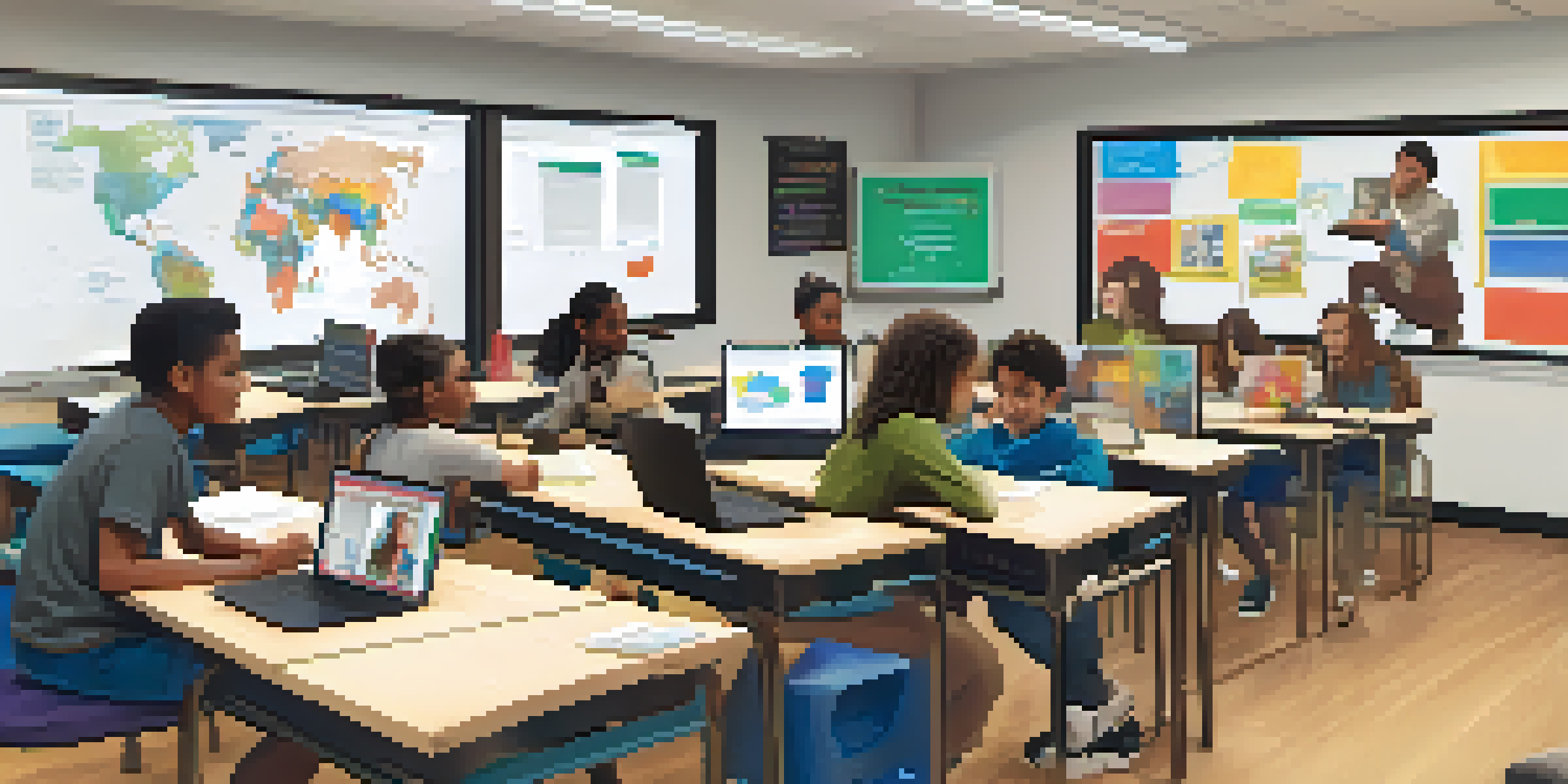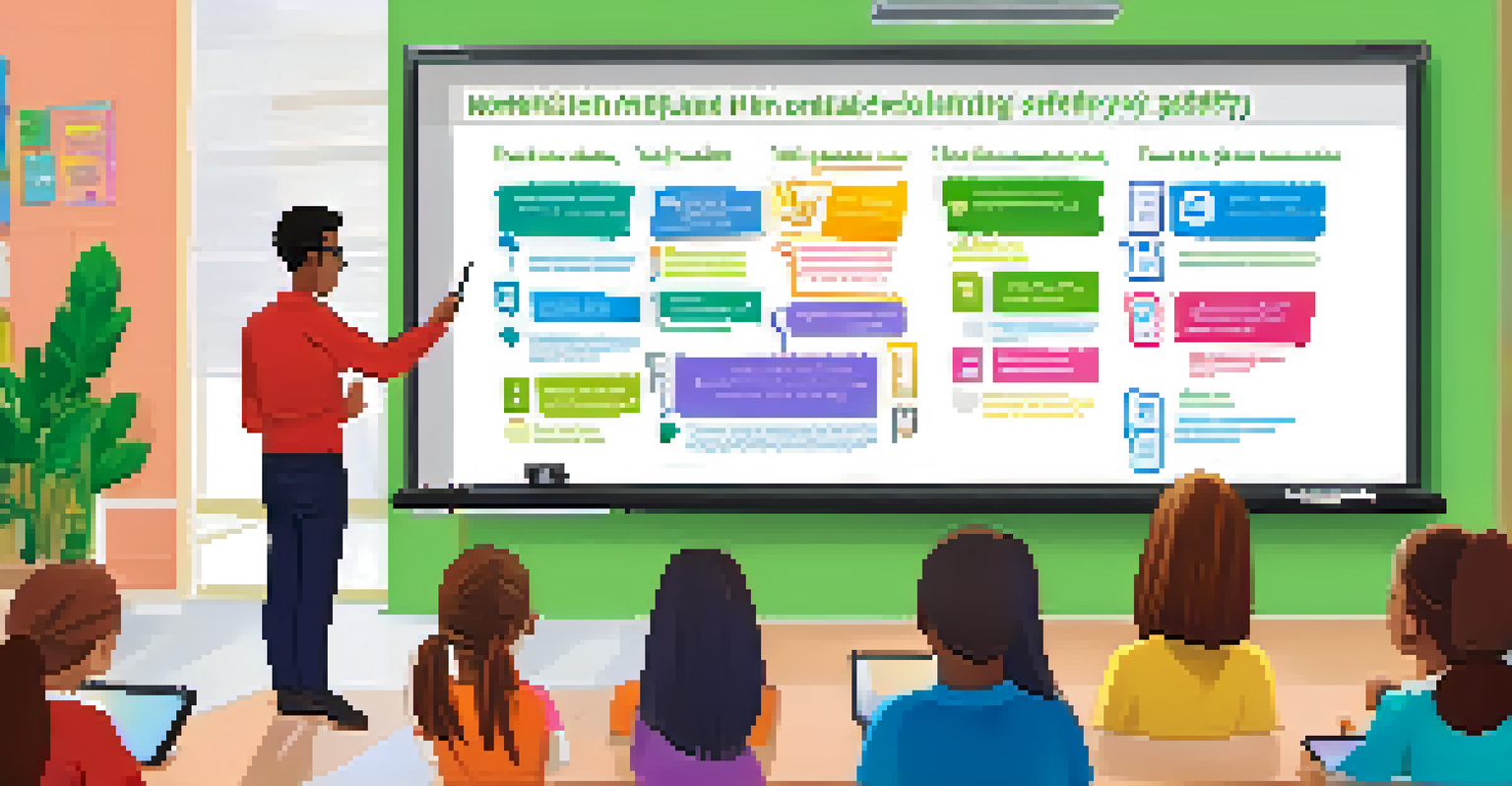How to Promote Digital Citizenship in Remote Learning

Understanding Digital Citizenship in Remote Learning
Digital citizenship refers to the responsible use of technology and the internet. In remote learning, students are navigating virtual classrooms, social media, and online resources, making it essential to instill good digital habits. Understanding this concept helps shape how students interact online and respect others in a digital space.
The internet can be a powerful tool for learning, but it also comes with responsibilities that we must take seriously.
As they engage in online learning, students often face challenges such as cyberbullying, misinformation, and privacy concerns. Educators play a crucial role in guiding students through these issues, ensuring they understand the impact of their online actions. This foundational understanding sets the stage for a more respectful and informed online community.
Moreover, promoting digital citizenship isn't just about avoiding negative behaviors; it's about encouraging positive interactions. By fostering an environment where students feel empowered to express themselves and support one another, we create a culture of respect and responsibility that extends beyond the classroom.
Setting Clear Expectations for Online Behavior
Establishing clear expectations for online behavior is key in a remote learning setting. Just as in a physical classroom, guidelines help students understand what's acceptable when interacting online. These rules can include respectful communication, proper use of technology, and the importance of maintaining privacy.

Educators can create a code of conduct for online interactions, involving students in the process to encourage ownership. This collaborative approach not only empowers students but also makes them more likely to adhere to the established norms. It’s essential that these expectations are communicated regularly and revisited as necessary.
Importance of Digital Citizenship
Understanding digital citizenship is crucial for students to navigate online spaces responsibly and respectfully.
In addition to setting rules, providing examples of appropriate and inappropriate behavior can be very effective. Visuals or role-playing scenarios can help students grasp the nuances of online interactions, making the expectations more relatable and easier to remember.
Integrating Digital Citizenship Lessons into Curriculum
One of the most effective ways to promote digital citizenship is by integrating relevant lessons into the curriculum. This could involve discussing topics such as online privacy, the consequences of sharing personal information, or the impact of digital footprints. By making these discussions a regular part of learning, students can better understand their responsibilities as digital citizens.
Digital citizenship is not just about technology; it is about the people who use it and how they choose to treat each other online.
For instance, incorporating real-world examples or case studies can help students connect the dots between theory and practice. When they see how online actions affect others, they are more likely to internalize the importance of responsible behavior. Additionally, hands-on projects can encourage students to explore digital tools while emphasizing ethical usage.
Furthermore, collaboration across subjects can enhance this learning experience. For example, a history lesson could involve researching credible sources online, which ties in the concept of digital literacy. This interdisciplinary approach not only enriches their education but also reinforces the principles of digital citizenship.
Encouraging Critical Thinking and Media Literacy
In a world saturated with information, teaching students to think critically is essential for digital citizenship. Media literacy allows them to discern credible sources from misleading ones, fostering informed decision-making. This skill is particularly important in remote learning, where students may encounter a variety of information online.
Teachers can encourage critical thinking by asking students to analyze the reliability of sources and discuss the motivations behind different types of media. Engaging students in debates or discussions about current events can also help them apply these skills in real-time. By challenging them to question what they see, educators can nurture a more discerning digital citizen.
Setting Behavior Expectations
Establishing clear guidelines for online behavior helps students know what is acceptable in a remote learning environment.
Moreover, integrating tools that promote fact-checking and source evaluation into lessons can enhance these discussions. For instance, using online resources to verify news stories can provide practical experience that students will carry with them beyond the classroom. This hands-on approach to media literacy empowers them to navigate the digital landscape responsibly.
Fostering a Safe Online Environment
Creating a safe online environment is paramount for promoting digital citizenship. Students need to feel secure to express themselves, ask questions, and seek help when needed. This involves establishing trust and open communication between students and educators, ensuring that everyone feels comfortable sharing their concerns.
Regular check-ins or anonymous surveys can provide insight into students' feelings about their online interactions. This feedback can guide educators in addressing any issues and making necessary adjustments to create a more supportive learning atmosphere. Additionally, teaching students how to report inappropriate behavior can empower them to take action if they encounter problems.
Incorporating lessons about online safety, such as recognizing phishing attempts or understanding privacy settings, is also crucial. These practical skills equip students to protect themselves and their information while engaging in remote learning. By prioritizing safety, we foster an environment where digital citizenship can thrive.
Promoting Responsible Use of Technology
Responsible use of technology is a cornerstone of digital citizenship. Educators should emphasize the importance of using devices and software ethically and effectively. This includes understanding copyright laws, avoiding plagiarism, and recognizing the value of original content.
By teaching students about intellectual property and the implications of sharing others' work without permission, we foster a sense of respect for creators. Incorporating activities that require students to create their own content can reinforce this lesson, encouraging them to appreciate the effort that goes into producing original work.
Engaging Parents in Education
Involving parents in digital citizenship education enhances support for students and reinforces positive online habits at home.
Additionally, discussions about the balance between screen time and offline activities are essential. Encouraging students to reflect on their technology use can lead to healthier habits. By promoting responsible technology use, we prepare students to navigate both their academic and personal lives with integrity.
Engaging Parents in Digital Citizenship Education
Engaging parents in digital citizenship education is a vital component of effective remote learning. When families are informed and involved, they can reinforce the principles of digital citizenship at home. Hosting workshops or providing resources can help parents understand what their children are learning and how they can support these efforts.
Moreover, open lines of communication between educators and parents can lead to collaborative problem-solving. For instance, if students are experiencing challenges with online behavior, discussing these issues with parents can foster a united approach to addressing them. This partnership enhances the learning experience and demonstrates the importance of digital citizenship in daily life.

Encouraging parents to model positive digital behavior is also crucial. By setting an example at home, parents can help their children develop good habits. This shared commitment to digital citizenship creates a supportive community that extends beyond the classroom.